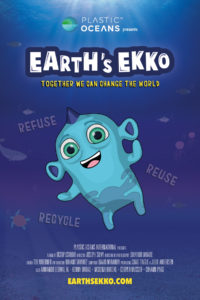Key Initiatives for 2020
Our fundraising efforts through 2020 will be focusing on the initiatives outlined below. Over 90% of all donations directly benefit our active programs. Read below or click on button to download.
Youth Education Through Film
We have just launched a new short film for kids aged 5 to 10-years-old, Earth’s Ekko. This 20-minute short is made available to schools and youth organizations at no cost. It will serve as a powerful tool for teachers and students to engage with each other on the issue of plastic pollution.
Allocation of Funds: These funds will specifically be used to translate the film, develop an education guide and translate that guide into multiple languages. This is of the utmost importance in order to spread the message as wide as possible, especially in the Asian countries where the problem is most prevalent. It gives us the best shot of achieving the goals of informing, engaging, inspiring and inciting action by millions of people, that can lead to solutions and meaningful change.
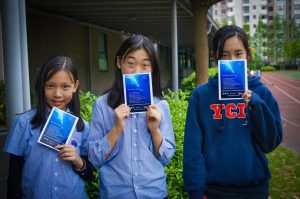
Students at the Yew Chung International School in Shanghai.
Funds for this will allow us to complete translations in the following languages: French, German, Portuguese, Mandarin, Korean, Vietnamese, Tagalog, Malay, and Thai. The costs associated to this includes translating the full film, short social-friendly clips, the full Education & Discussion Guide, and accompanying infographics. Translations will be completed by a mixture of our internal team, as well as various partners that we have in each region.
Support Needed: $50,000*
*This amount allows for all translations in languages mentioned above. Any funds beyond that will allow additional translations, with these being the priorities: Japanese, Arabic, Khemer, Hindi, Bengali, Italian, and Greek.
Rethink. Refill.
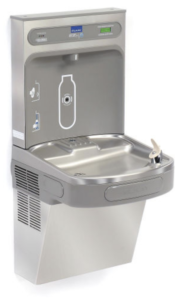
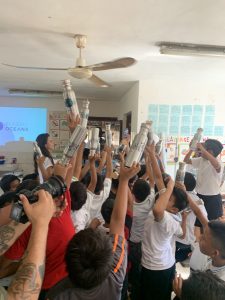
Kids near Tulum, Mexico, celebrating their “Rethink.Refill” participation.
Allocation of Funds: Funding will allow us to purchase refilling stations at a discounted rate. This rate will allow us to provide the following package at a cost of $2,500 per school:
- One water refilling station.
- 100 reusable water bottles.
- These serve as a seed quantity that students will sell as part of a fundraising campaign that they organize and run. Those funds are used to purchase additional refilling stations.
- Additional water bottles will be made available at our cost. These can also be sponsored with additional funds by individuals or organizations.
- An informational guide that outlines the issue of plastic pollution, the importance of being part of the solution
Support Needed: $250,000*
*This will fund the program at 100 schools around the world, inspiring a new generation to rethink plastic, while also keeping up to 50 Million plastic bottles from polluting our environment over the next several years.
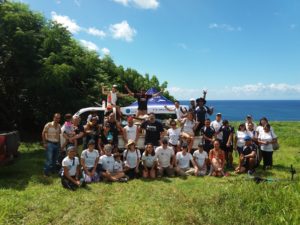
Our beach cleanup crew on Easter Island (Rapa Nui), March 2019. We collected over 700 pounds of plastic waste in two hours!
Supportive Activism
We actively pursue ongoing activism with our full-time team, volunteers, and also with other like-minded non-profits, education and research institutions, governments, corporations and others. These activities include such things as beach cleanups, participating in conferences, educational sessions, and more.
We are specifically seeking funds that will allow for one organized beach/sea educational cleanup per month in 2020.
Allocation of Funds: Each beach cleanup has an average cost of $2,500. This fluctuates depending on location, size, volunteer support, and associated travel for team leaders if no local person is available. The funds cover supplies, such as buckets, waste bags, latex gloves, rakes, transport of plastic waste, first aid kits, liability insurance, marketing, and any permits that are required by local municipalities. For the full year, we would also request support that allows for the production of Plastic Oceans banners and other supporting materials to help organize and promote the beach/sea cleanups. Events will be in the US, UK, Canada, Mexico, Chile, Indonesia, and Thailand.
Support Needed: $32,500 per year
Community Engagement Program
Help us guide and support individual facilitators that take our education programs to their local communities.
This ties in with all of our awareness efforts, especially those that are outlined in this document. It is essential for us to continue to develop a team of people that can serve as educators – and inspirational leaders – on the topic of plastic pollution. These are our true champions … those that can best engage on the issue with their local communities, and in local languages. We are in need of funds to better organize this effort, provide resources to individuals acting as our engagement facilitators, and most importantly, to expand it globally.
Allocation of Funds: With the guidance of a certified educator (funds will help support the cost of this consultant), we will produce an education manual for Engagement Facilitators, outlining key facts, best practices, suggested material, expectations and goals. We will also conduct training sessions, developed with the guiding hand of the certified educator. After the initial training is completed, Facilitators will have access to an online resource folder that is updated regularly, providing them with all the latest news and facts about plastic pollution. Our goal is to educate 500 Community Engagement Facilitators per year.
Support Needed: $60,000 per year
New Film Production
Film and other digital content creation are at the core of who we are. It’s how we best, and most powerfully are able to engage individuals, communities, governments, corporations, and others. It’s not only how you achieve the greatest level of understanding on the issue of plastic pollution, but it’s also how you are able to best spread the message to the largest audience possible.
Allocation of Funds: Our plan was to make 2019 our most aggressive year yet for the production of film/video content. We are happy to report that we have been successful – now offering several educational films in our library, most of which are made available for free. We are currently in production on one feature-length documentary, but are also in pre-production on another one that will address freshwater conservation issues. We have also continue to push out a steady stream of short films, and social-friendly micro videos.
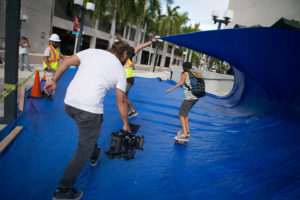
Production on our youth-oriented film, Earth’s Ekko.
Support Needed:
Feature-length Film: $500,000 is the minimum we need to get started.
- Level of support determines how you or your designated entity are recognized: Executive Producer, “With Support From”, or a mention in the credits. We estimate the full cost of producing a 90-minute film to be $1M to $1.5M. That’s all-in, including some marketing budget and producing educational material to accompany the film.
Short-Films: $10,000 to 20,000 per film
- 10 to 22 minutes long.
- Topics can be developed with your team.
- Recognition based on amount funded.
Micro Films: $2,500 to $5,000
- 60 to 90 seconds long
- Topics can be developed with your team.
- Recognition based on level of amount funded.
Scientific Research
We are fortunate to have a science team lead by two amazing researchers north and south of the equator.
- Camila Ahrendt has been leading the way in South America, currently conducting research in Chile’s Patagonia region that will provide much needed insight into the plastic pollution that is covering the waters and shorelines of this most precious of regions.
- Charlie Rolsky, out of Arizona State University, continues to conduct amazing research on microplastics and is also one of the foremost researchers on killer whales.
Support Needed: $100,000 per year
General Operations
We are fortunate to have low operational costs, and we support those by allocating no more than 10% of all donations toward covering them. This includes things like staff, website hosting, insurance, office supplies, travel; and subscriptions to services for accounting, donation management, and website maintenance.

